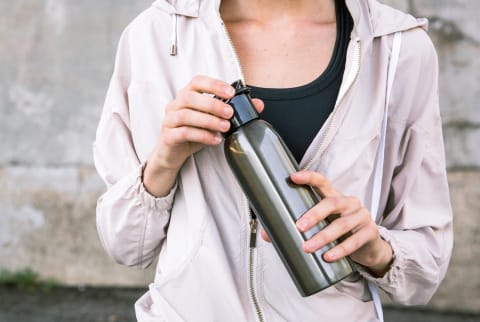Advertisement
How To Clean Your Reusable Cups & Water Bottles, From An Immunologist


Information continues to spread about the new coronavirus or COVID-19. Amid concerns, we wanted to know if the reusable water bottles and coffee mugs we so diligently carry around harbor dangerous bacteria.
And we're not alone. Starbucks announced Thursday it would take a pause on filling personal mugs along with using "for here" ware for food or drink ordered in stores.
To get to the bottom of it, we consulted immunologist Heather Moday, M.D. Here's how and why we need to keep them clean.
What's the best way to clean reusable cups?
Water bottles and coffee cups should be washed daily, after each use. "If you go to the gym and refill it a few times from the cooler, no problem," Moday told us, "but after you get home, simply wash and let dry."
For those who don't have dishwashers, you really only need three things to clean a reusable cup or bottle. "Plain old hot water, detergent, and a bottle brush," Moday said. If your bottle hasn't been cleaned in a while and you're worried about buildup, she suggested using cleansing enzyme detergent tablets.
"As far as I know, there is no difference in frequency [of cleaning] during flu season," she told us. That doesn't mean we should be taking the recommendations lightly as respiratory diseases are spreading—it simply means we should be taking them more seriously year-round.
Why is it important to clean them?
Unlike dishware, which often stays in the comfort of our own homes, water bottles and reusable cups travel with us on public transportation, elevators, and other densely populated areas. In other words, it's very easy for them to come in contact with infectious germs.
"Bacteria and viruses can collect on the outsides, the tops, and the drinking spouts of water bottles," Moday said. And since some coronaviruses can survive on hard surfaces for up to nine days, it's imperative to practice daily washing.
Additionally, unfiltered tap water may contain other bacteria and microbes, which can grow inside the water bottle over time. If you're drinking sports drinks, juices, coffee, or other beverages in your bottles, those are even more likely to grow bacteria and mold.
If you thought it couldn't get any grosser, think again. "When we drink, some of our oral bacteria and saliva end up in the bottle," Moday said, "and biofilms of bacteria can form if they're not cleaned."
If you're thinking it might be easier to just get a disposable coffee cup or a pack of plastic water bottles—try not to. "There really is no reason to use throwaway cups," Moday said. "It's just bad for the environment."
As long as you are washing with soap and water daily, your cups and bottles should be safe from infectious germs. In fact, the same rule applies for hand-washing, which you should be doing often.